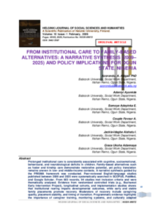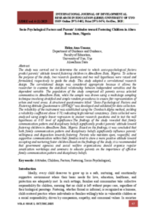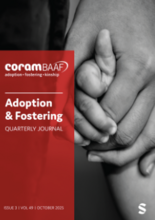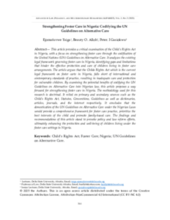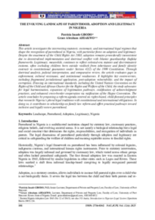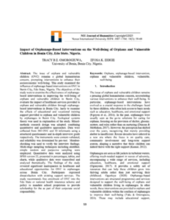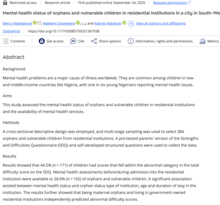childrens_living_arrangement
Displaying 1 - 10 of 137
This article tells the story of Nigerian missionaries Olusola and Chinwe Stevens, who have spent three decades rescuing babies and young children in central Nigeria from harmful traditional beliefs that label them as “cursed” and sometimes lead to
This article reviews global evidence on the impacts of institutional care versus family-based alternatives and examines how these findings inform foster care reform in Ogun State, Nigeria. It synthesizes research from 2009–2025 to identify key developmental outcomes, implementation lessons, and policy priorities for transitioning away from institutional care.
The piece argues that Lagos, Nigeria’s largest city, is mishandling the growing crisis of street children by relying mainly on enforcement actions — such as rounding up boys seen begging or washing windscreens along busy roadways
This study examines how socio-psychological factors influence parents’ attitudes toward fostering children in Akwa Ibom State, Nigeria, using a correlational design and survey data from parents in urban and rural communities. Findings show that family communication patterns and disciplinary beliefs significantly predict positive attitudes toward fostering, highlighting the need for sensitization and education initiatives led by government and social welfare organizations.
This study explores the informal foster care practices of the Igbo ethnic group in South-East Nigeria, revealing both its cultural value in providing family-based care and the challenges it faces. Findings highlight the lack of regulation, data, and support services, underscoring the need for greater involvement of government agencies and social workers to ensure children’s safety and well-being.
In the piece, the Association of Orphanages and Homes Operators of Nigeria (ASOHON) Southern Nigeria chapter calls for stronger collaboration between orphanage operators, government agencies and other stakeholders to build a more inclusive, family
This article provides a critical examination of the Child's Rights Act in Nigeria, with a focus on strengthening foster care through the codification of the United Nations (UN) Guidelines on Alternative Care. It analyzes the existing legal framework governing foster care in Nigeria, identifying gaps and limitations that hinder the effective protection and care of children living in foster care arrangements.
This article analyzes how Nigeria’s statutory, customary, and international laws intersect to shape adoption and legitimacy, revealing inconsistencies, cultural resistance, and systemic weaknesses that undermine children’s rights. It calls for legal harmonization and reforms grounded in child-centered and rights-based principles to create a more inclusive and secure framework for recognizing parenthood.
This study examined the impact of orphanage-based interventions on orphans and vulnerable children (OVC) in Benin City, Nigeria, focusing on healthcare, education, and vocational support. Findings revealed significant inadequacies in these services, with participants expressing dissatisfaction, and the study recommends free health insurance enrollment and mandatory school scholarships to improve OVC well-being.
This study assessed the mental health of children in 12 Nigerian residential institutions and found that many had abnormal scores on the Strengths and Difficulties Questionnaire, with risks linked to orphan status, type of institution, and length of stay. The findings highlight the urgent need for routine mental health assessments and better care for children in residential settings.

